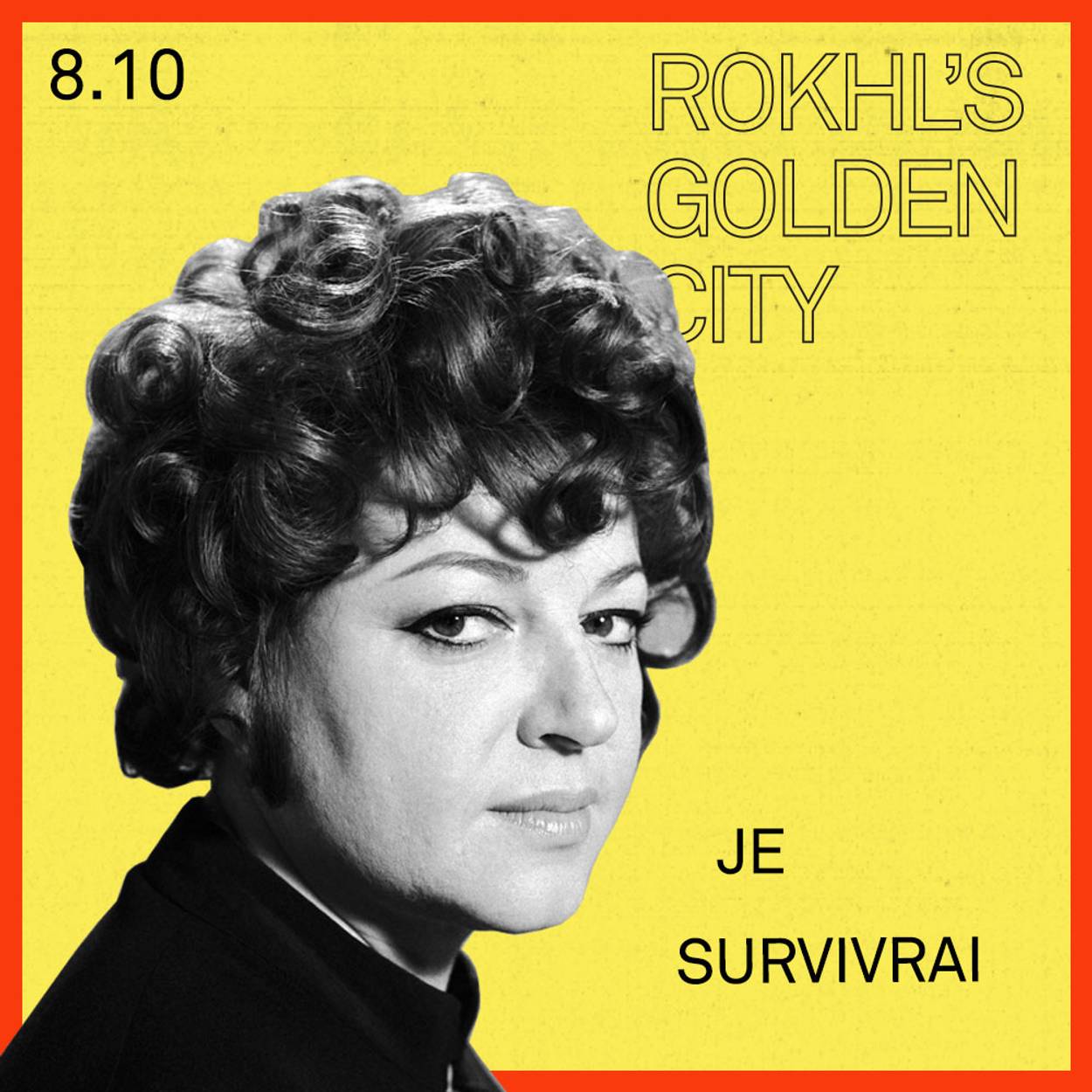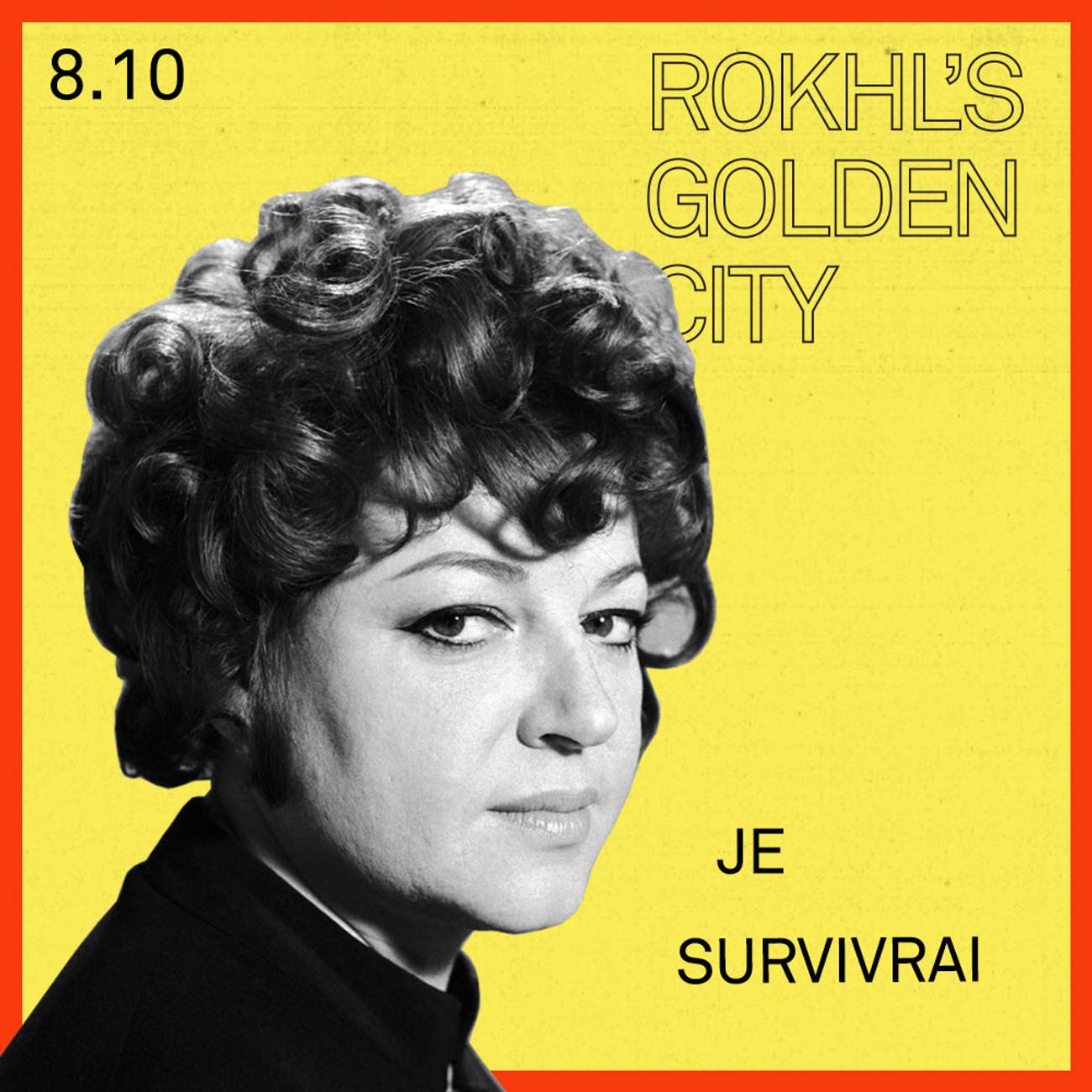Queen of the Night
Rokhl’s Golden City: The troubled family life of Régine—a French singer, disco mogul, and a pioneering disc jockey




I’m more than a little embarrassed to say that I had never heard of Régine until her death this past May. Her New York Times obituary is the kind to make your jaw drop. Régine was a pop chanteuse, sometime screen actor, nightlife impresario, and tireless entrepreneur. And that doesn’t even scratch the surface.
Legendary French pop star Serge Gainsbourg wrote some of her best songs. Steven Sondheim wrote “I Never Do Anything Twice” for her to sing in the criminally hard-to-find 1976 Sherlock Holmes caper The Seven-Per-Cent Solution.
She is credited with inventing the modern discotheque sound setup: two linked turntables ensuring a seamless music flow with no gaps for record flips. This new sound system replaced jukeboxes, allowing far greater control of an establishment’s musical environment. Régine herself worked the turntables as the first modern disc jockey, at the Whisky a Go Go in Paris, in 1953.
A few years later, she opened her own place, Chez Régine, where she began to cultivate the patronage of the rich and famous, jet setters and socialites, as well as the young and talented. It was visiting American performers who first danced the Twist at Chez Régine in Paris. In her memoir, she recounts ordering copies of “Let’s Twist Again” by “Chubby Chaker” [sic] to bring to Cannes during the film festival. She was already opening a second branch of Chez Régine, this one in Cannes, and she saw the potential for promotion. In one of her many brilliant acts of synergy, she made sure the festival’s stars were photographed doing the Twist at her club, ensuring the launch would be a success.
These were only the first steps in a global nightlife career so enduring, it earned her the name “Reine de la Nuit,” or Queen of the Night.
Régine’s impact was so great you’ll find her mentioned in any serious history of disco. She’s namechecked in “New York You Got Me Dancing.” Among all the infamous (and now departed) discos of late ’70s New York, Andrea True sings, I still prefer getting dressed up for Regine’s …
Before she was “Régine,” though, she was Rachelle Zylberberg, child of Polish Jewish parents, born at the end of 1929. Actually, according to her 1985 memoir, Appelle-moi par mon prenom (Call Me By My First Name), she didn’t even start out as a Zylberberg. Her father, Joseph Zylberberg, married Régine’s mother in a Jewish ceremony, but failed to follow up with a French civil marriage. Nor did Joseph legally register himself as father to her or her little brother. So, for the first few years of her life, Régine went by her mother’s last name, Rodstein. It was only once Joseph remarried and had another child that Régine’s new stepmother insisted he claim legal paternity for all three children. Her stepmother, Therese, was also a Polish Jew, and within their newly reconstituted family they spoke a mixture of Polish, Yiddish, and French.
In her memoir, Régine is unsentimental with regard to her father, whom she refers to almost exclusively as Joseph. The father she describes there is illiterate, powerfully built, and given to violence, a man whose one true love was playing cards, specifically poker. In 1972 she paid tribute to Joseph with a song titled “Azoy,” a Yiddish word meaning “like that.” My father, she sings, taught me that life is like that. It has its ups and downs, highs and lows.
Fair enough.
The lyrics shade into banal without crossing into treacle, and Régine puts it over with unique panache. Contrary to the gently weary tone of “Azoy,” however, her memoir recalls violent fights and reconciliations between her mother and father, and the real-life lesson drawn thereof: “Tres vite, je pense que la vie, ca doit etre ca.” Very quickly, she thought that life, this must be it.
C’est pour trouver sa liberté
Qu’il avait quitté Varsovie
Et chaque soir, il nous disait
Quand sa journée était finie
Azoy …
“Azoy” describes Régine’s father leaving Warsaw to seek his freedom, and how every night, when the day was done, he would tell them azoy, that’s the way life is.
It’s sort of true. Joseph left Poland to avoid military service, arriving in Belgium with Régine’s mother. And the song is indeed accurate in its characterization of Joseph as a single father, which he was for a few years, after Régine’s mother abandoned the family to relocate to Argentina. But as Régine tells it in her memoir, there were few of the song’s cozy bedtime father-child lessons.
“Azoy” makes oblique reference to 10 years after her father’s relocation to Paris, that is, the outbreak of WWII. He held us tight, she sings, and in his Polish accent, he told us stories of the old days. But we know that Joseph told her and her brother almost nothing of his life in Poland. More importantly, Régine was separated from Joseph for much of the war. At one point, Joseph returns to the convent where Régine is hiding in the south of France. He tells her that in two weeks they will be leaving for America! He only needs to obtain the papers necessary for their departure.
Régine does nothing but dream of America day and night. Alas! Instead of returning to whisk her away to the promised land, Joseph is arrested by the Germans. Even worse, he is carrying papers that identify Régine by name, as well as her hiding place, meaning the Germans could find her at any minute. This necessitates new papers, adopting a new name and new parents, who take her to a new hiding place.
The theme of papers, papiers, runs through Régine’s story. Right before the end of the war Joseph is arrested again. This time he is carrying false papers attesting to his status as an Aryan Pole. The Nazis torture him anyway. When he is finally reunited with Régine, he is walking with a limp from those beatings. It is understood that having the right kinds of paper means the difference between life and death. In 1966, Régine recorded “Les P’tits Papiers,” written by her friend Serge Gainsbourg, one of 12 songs he wrote for her. The song describes the kinds of paper that pass through our lives: rice paper, glossy paper, sticky paper, carbon papers.
Laisser parler
Les p’tits papiers
(Let them speak, the little papers)
Isn’t it absurd, the song implies, how life and death can hang on something so insubstantial? It’s typically brilliant songwriting from Gainsbourg. All those little pieces of paper, he writes, c’est du vent, it’s only wind, a line that subtly but surely points us to the book of Koheles (Ecclesiastes): “all is vanity!” (hevel) or, alternatively translated, wind.
Another song Gainsbourg wrote for Régine speaks to the violence that marked her life. In her memoir, for example, she describes overcoming her initial hatred for her new stepmother. Young Régine makes an intervention as her father begins beating her stepmother. This was the moment she learned what tenderness was: the urge to take the blows on behalf of someone you loved.
In “Les Blues” the narrator likens her bruises (the blue marks) to precious gems. And one day, when she is left without a cent, she will pawn them all, the emeralds around her neck, the amethysts all over her body.
In 1968 Régine appeared in Mazel Tov ou Le Mariage, known in English as Marry Me, Marry Me. Like The Seven-Per-Cent Solution, Marry Me, Marry Me is also extremely hard to find. Apparently, director Claude Berri plays a Jewish encyclopedia salesman in a sort of French anticipation of the American schlemiel movies of that era, like The Heartbreak Kid. Régine has a secondary role in the movie and sings “My Yiddishe Mame” for the soundtrack.
I find it somewhat ironic, but also emblematic of Régine’s complicated life, that she recorded this particular ode to the saintly, suffering Jewish mother. Régine’s own mother abandoned her, taking off for Argentina when she was just a small child. The constant anxiety of unwanted pregnancy (and motherhood) is another thread in Régine’s story. When she and her first husband, Paul, did have a child, her relationship with her son was anything but self-sacrificing. Eventually she and Paul divorced and Paul took custody of their son, Lionel, allowing her to build her global nightlife empire without other obligations. Their estrangement is something Lionel would hold against Régine for the rest of his life.
It is perhaps the most obvious thing in the world to call Régine a survivor. She survived a difficult childhood, which was then cut short by the destruction of WWII. She survived the war as a hidden child, subsequently willing herself to fulfill her dreams of great wealth and fame. She even managed to survive great wealth and fame, living to the impressive age of 92.
More than that, though, there is something I find incredibly moving about this video for her French version of “I Will Survive.” She reminds me of any one of the Jewish mothers of my friends, women who all survived various levels of bullshit specific to their socio-historical moment. She makes no attempt to appear more French or less Jewish. She is definitely not thin in a country obsessed with slenderness, something attested by the many failed diets recorded in her memoir. And here she is, nonetheless, attempting her own awkwardly charming dance moves, resplendent in her green caftan, a true queen, despite it all.
ALSO: My friend Tzipora Weinberg will give the upcoming Max Weinreich Fellowship lecture: Orthodox, Female, Poet: The Litvish Life of Hadasah Hirshovitz Levin, 1912-1946. Sept. 1, more information here … In-person auditions are coming up for the Yiddish Philharmonic Chorus. All songs are in Yiddish but no prior language knowledge is necessary. Auditions will be Aug. 30 and Sept. 6. Email [email protected] for a slot … Yiddish classes start on Sept. 19 for all levels at the Paris Medem Center. Click here for more information.
Rokhl Kafrissen is a New York-based cultural critic and playwright.